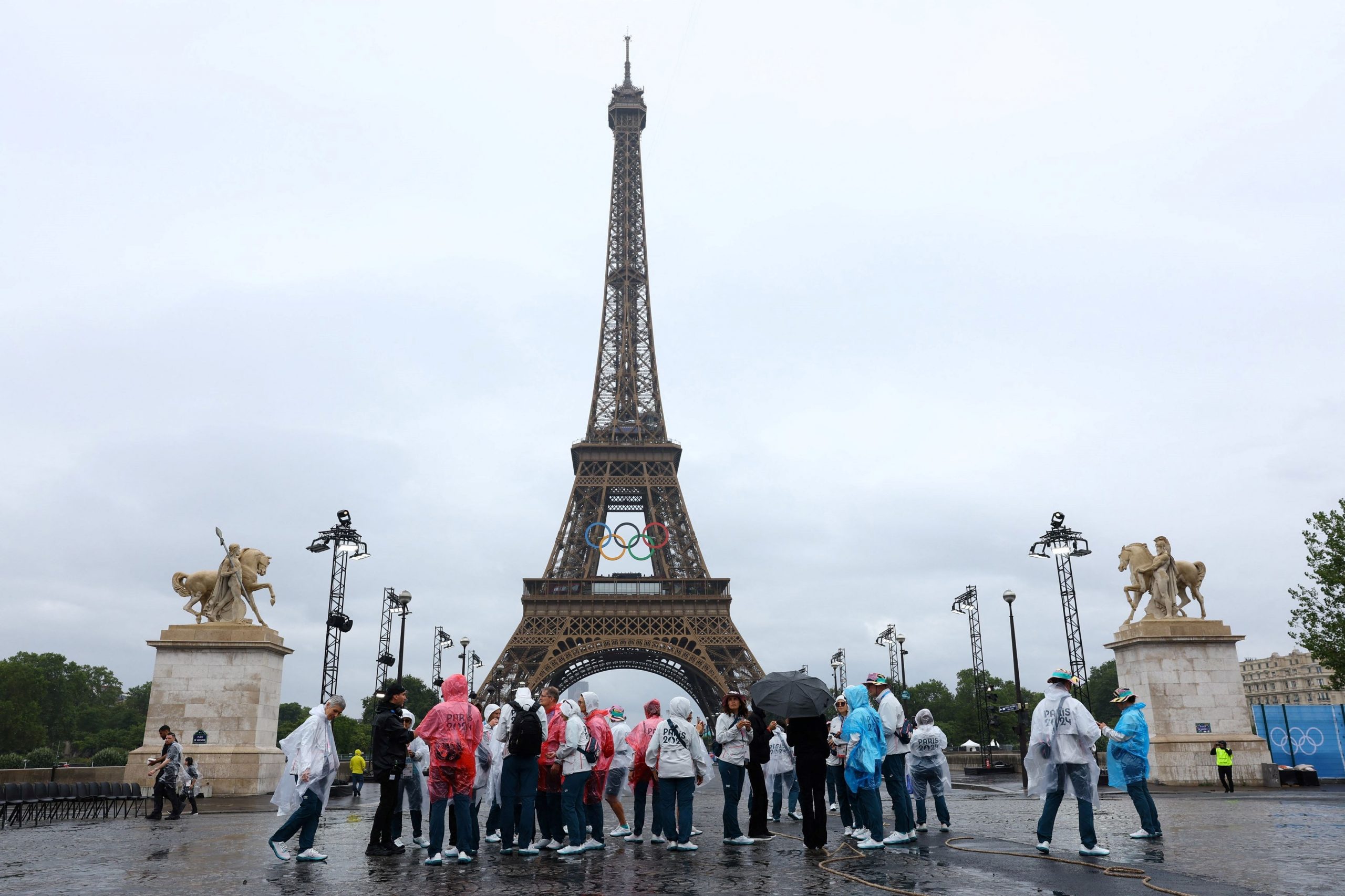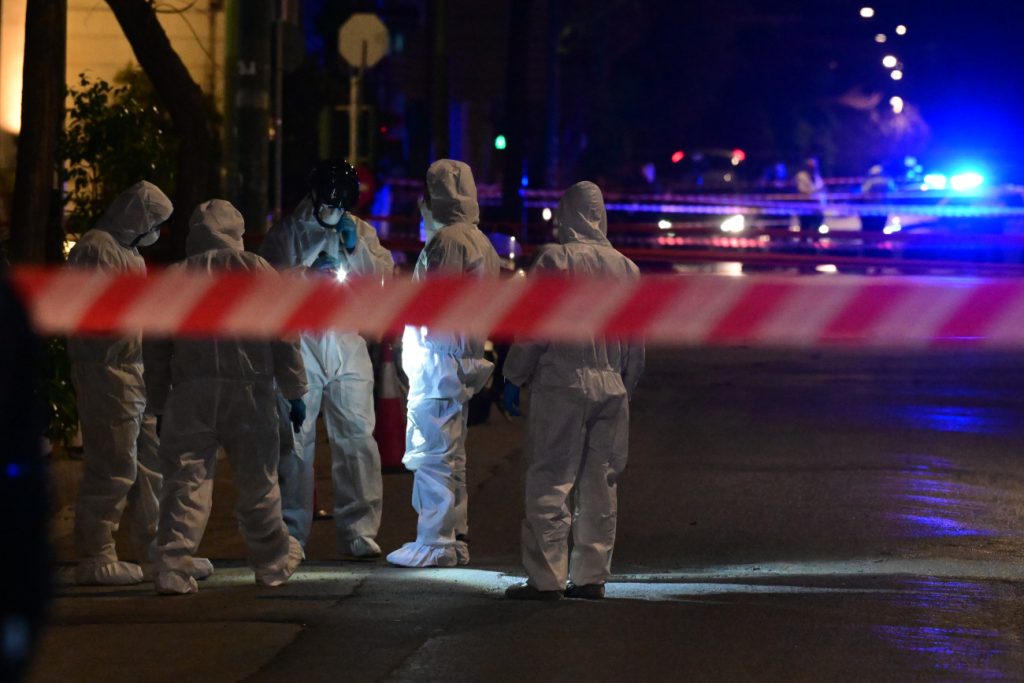ARIS—We interrupt this mad, mad, mad American summer to deliver unexpected relief from overseas:
The Olympics!
Not a minute too early, if you ask me.
At the moment, our TV screens and home pages are awash in chaos: election scrambling, political elbowing, infighting, bickering, a genuinely horrifying assassination attempt and a steady pipeline of conspiracy theorizing.
The month of July already feels 11 weeks long. It’s exhausting.
Beach volleyball by the Eiffel Tower, anyone?
Sounds perfect, honestly. Count me in.
I’m not saying the Olympics aren’t capable of their own chaos, as a sabotage attack on France’s high speed rail system proved on Friday. And I’m not saying the Olympics can be a catalyst for national unity. That’s absurd pressure for any sport, team, or athlete, even Simone Biles.
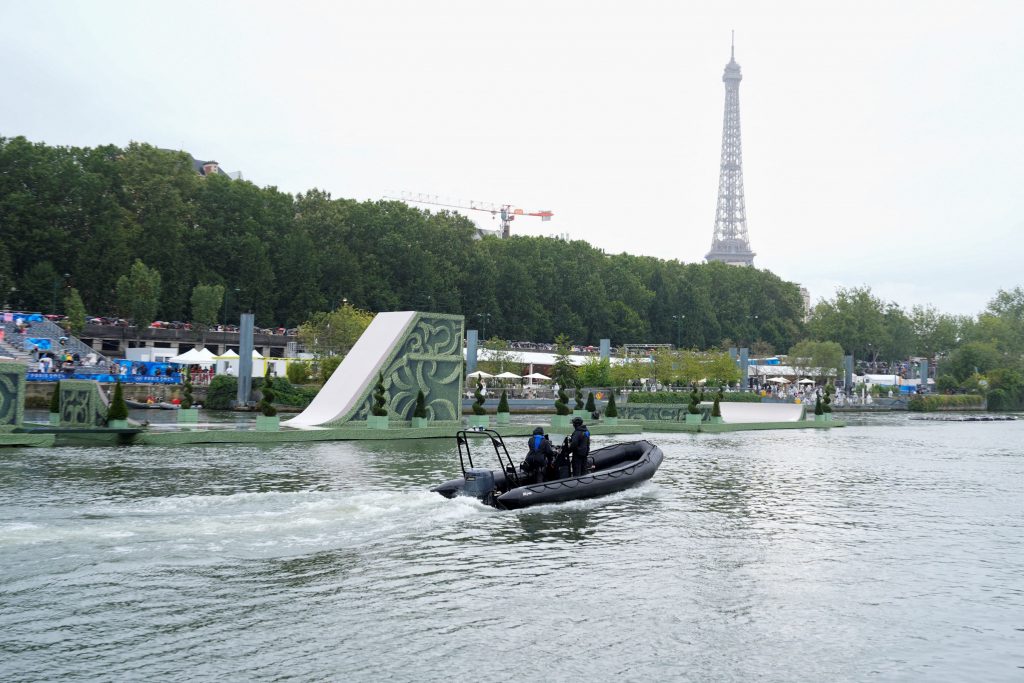
Paris 2024 Olympics – Paris, France – July 26, 2024. A police boat patrols the Seine River in Paris, France, before the opening ceremony of the 2024 Summer Olympics, Friday, July 26, 2024. Morry Gash/Pool via REUTERS
We can’t expect Olympic kayaking to stitch our feuding nation together: We were all shouting across the political/cultural divide until we collectively fell in love with Olympic kayaking, and we decided to drop our differences and convert Washington, D.C. into an enormous kayak course.
Not a bad idea, actually. But not what I’m saying.
I’m saying the 2024 Games are a breath of fresh air.
In past cycles, the Olympics arrived with their own obnoxious bombast, marketed as the Most Important Thing of the Summer, and endlessly puffed up by television partners and sponsors.
The noise, the music, the constant barrage of sponsorship and promotion, the inexplicable mascots—it was easy to be tired of the Olympics before they even started.
This year feels different. These Games, kicking off with a waterborne opening ceremony down the Seine, feel like a reprieve from the calamitous headlines of the moment.
They’re the first Games with a crowd in a while. The Olympics will be contested before a full audience for the first time since 2018. The 2020 Tokyo Summer Games (postponed to 2021) and Beijing Winter Games were lonely, sterile affairs held under intense Covid pandemic restrictions.
For Paris, the biohazard has been helpfully incorporated into the competition. You’ve probably heard by now that the Seine—a river so dodgy it’s been illegal to swim in for a century—is also being used for Olympic events.
While sun-kissed Olympic surfers get to ride the pristine waves of Tahiti in French Polynesia (how did I not score that assignment?), our poor triathletes and open water swimmers are sentenced to paddle in the ancient Gallic murk, after robust but not fully persuasive clean-up efforts.
“Sure, it creates a debate, and it’s not the easiest thing we could have done,” Paris 2024 boss Tony Estanguet told the Journal’s Joshua Robinson. “But it sends a strong message of audacity.”
There it is, the true, inextinguishable Olympic spirit: civic hubris. It is a requirement for every Games host to brush aside public resistance, logistical hurdles, spending requirements and common sense to make the Games happen, because once you agree to hold the Games, the Games must happen.
Despite corruption scandals and decaying stadiums left behind in former host cities, the Olympics (at least the summer ones) retain an undeniable political appeal—an indefatigable “Let’s Put On a Show” spirit that seduces leaders in cities like Paris and Los Angeles (your 2028 summer host, don’t forget!).
The French, coming off their own overheated political summer, are upholding the tradition of the host nation’s population being ambivalent to hostile to the Games. A French radio poll this month ranked the public’s Olympic attitudes thusly: indifference (36%), concern (24%), satisfaction (23%) and anger (5%). Regrettably, ennui did not rate a ranking.
Of course, that is unbridled rapture compared with the reaction in Boston—an early front-runner and the U.S. nominee to host these 2024 games—which wound up scuttling its bid after locals discovered the Dunkin lines would be three times as long.
Negativity (traffic! security! prices!) always swirls before any Olympics, with good reason. On Friday morning, Paris awoke to news of what authorities said was a coordinated sabotage attack upon the country’s high-speed trains, potentially halting service and disrupting travelers for days.
Ugh.
Meanwhile, we have our first sporting scandal: a Canadian women’s soccer coach sent packing after revelations the team had used drones to spy on the practices of past opponents.
It’s a bird…it’s a plane…no, it’s actually just Canadian soccer.
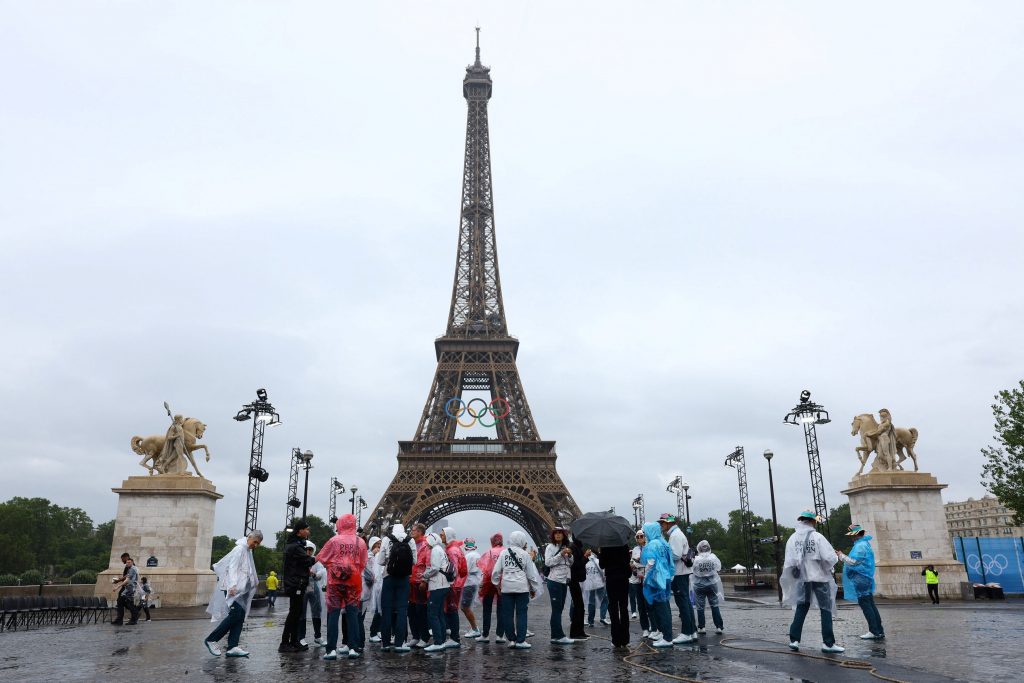
Paris 2024 Olympics – Opening Ceremony – Paris, France – July 26, 2024. Spectators are seen wearing rain coats near the Eiffel Tower ahead of the opening ceremony of the Paris 2024 Olympics. REUTERS/Stephanie Lecocq
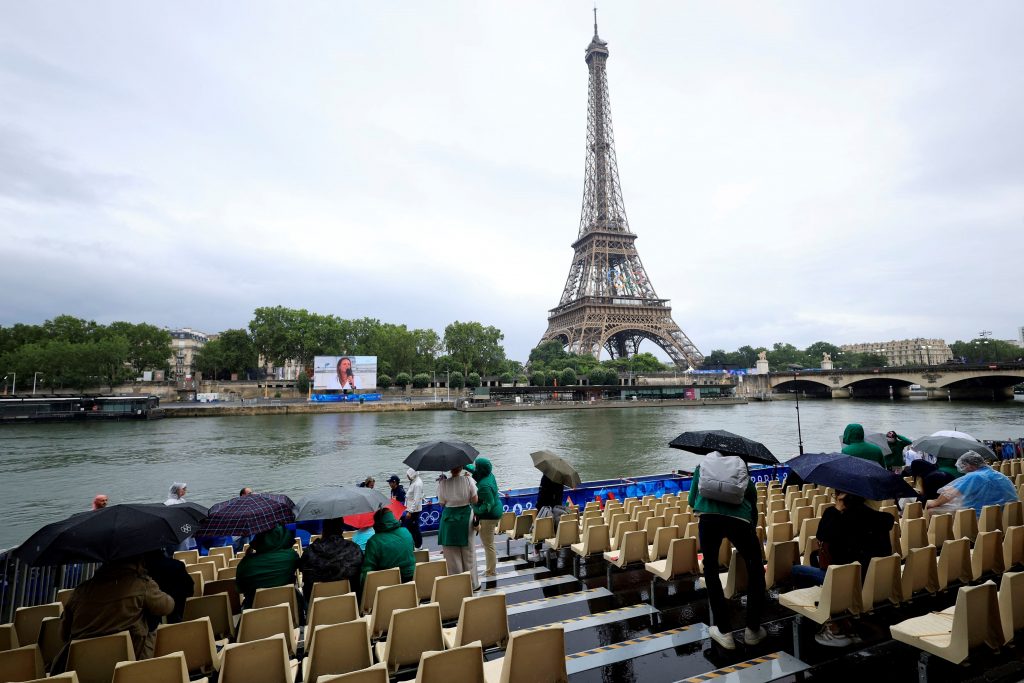
Paris 2024 Olympics – Opening Ceremony – Paris, France – July 26, 2024. Spectators hold umbrellas in the rain in front of the Eiffel Tower ahead of the Opening Ceremony REUTERS/Louisa Gouliamaki
Disruptions and bad press are common side effects. But as the Games begin, there’s almost always an abrupt shift to patriotism and pride, especially if the host’s athletes begin to shine.
French athletes like basketball big man Victor Wembanyama, swimmer Léon Marchand, judokas Clarisse Agbegnenou and Teddy Riner, mountain biker Pauline Ferrand-Prévot, the French women’s soccer team—there’s an opportunity to galvanize France and seal legend status within the homeland.
The U.S., meanwhile, is stacked, as always. This country reliably delivers much of the star power to the Summer Games, and 2024 is no different. There are the household names—Biles, the brilliant gymnast eager to rebound after a wobbly Tokyo; pool dynamo Katie Ledecky, ready to add to her seven gold medals. Sprinters Noah Lyles and Sha’Carri Richardson plan to electrify the track along with perennial record breaker Sydney McLaughlin-Levrone, and there’s the outside chance of a debut by the 16-year-old comet Quincy Wilson, a surprise alternate member of the men’s 4×400 relay team. Another phenom is U.S. gymnast Hezly Rivera, who turned 16 in June.
Meanwhile, you can expect a steady fuss about a new Olympic sport with U.S. origins: breakdancing. Yes, they’ll be breaking in Paris, over at Place de la Concorde, the latest evolution for an art born in the Bronx and exported worldwide. If Olympic breaking sounds strange to you—awarding points and medals to talented individuals pop-locking and back-spinning—remember that the Olympics is an event with a lengthy history of competitive horse dancing.
Basketball? We invented that, too. LeBron James and Steph Curry lead a powerful Team USA into an international field with increasing depth (hello Serbia and Nikola Jokic, Greece and Giannis Antetokounmpo) and even a challenge from upstairs neighbor Canada. The U.S. women are even heavier favorites than the men, the WNBA legends Diana Taurasi and A’ja Wilson leading a roster that lacks rookie phenoms Caitlin Clark and Angel Reese but seeks to build on the recent buzz for the women’s game.
There’s much, much more. Those names are just a drop in the bucket. I’m sure there are people yelling at me that I haven’t mentioned the tennis star (and with LeBron, flag bearer) Coco Gauff, or the cycling track racer Jennifer Valente, or returning gold medal gymnast Suni Lee, to say nothing of international sensations like Jakob Ingebrigsten (middle distance running), Shericka Jackson (sprinting) and pole vaulter Mondo Duplantis, raised in Louisiana but competing for his mother’s home country of Sweden.
Then hang on for the unknowns. Much of the charm of the Olympics is the discovery—the competitor with little to no profile suddenly thrust upon a massive stage. Olympic fever can turn a placid civilian into a rabid fan of smaller sports like fencing, table tennis, canoeing, trampoline, discus and steeplechase.
ave at it. Football is in preseason training camp. Baseball is in its midsummer doldrums. Nothing wrong with surrendering to a little steeplechase.
As always, the primary vessel for Olympic coverage within the U.S. will be NBC, which has a bazillion hours of planned coverage, from prime time packages to nonstop live coverage via its Peacock streaming service. There’s even the option of following the Games via an artificial intelligence Al Michaels, who will give you a bespoke rundown of your favorite Olympic events while hopefully adding a few Howard Cosell stories.
Paris is the star, however. Besides the Seine swimming and the Eiffel beach volleyball, there will be storybook locations like Sacré-Coeur (a late climb for cycling races) and equestrian and pentathlon at Versailles. French Open hive Roland-Garros will host Olympic tennis on its famous terre battue. On the premises will be the 38-year-old King of Clay himself, Rafael Nadal, hoping for a fitting last hurrah before retirement and adding a delicious doubles date with his Spanish heir, Wimbledon champ Carlos Alcaraz.
Rafa and Carlitos, playing doubles? No disrespect to the nearby Louvre, but I’d rather see that than the Mona Lisa.
And that’s the thing. Through it all, the Olympics retain a certain, well, je ne sais quoi. They are expensive, overwrought and exasperating, and they always overdo it on the promotion, but at the core of the Games is a genuine athletic competition and an uplifting realization: Every day, you can see the best day of someone’s life.
So let the Games begin. To give us all a break, at least.
